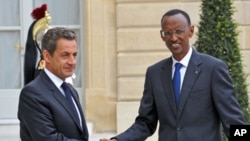A new French report appears to erase suspicions that Rwandan President Paul Kagame and his associates triggered the events leading to the 1994 Rwandan genocide. Previous accusations froze French-Rwandan ties that only recently have warmed up.
Commissioned by two French investigating judges, the report apparently dismisses a central French accusation behind the Rwandan genocide about the origins of a 1994 missile that destroyed a plane carrying Rwanda's then-president Juvenile Habyarimana. The plane crash helped trigger the genocide, in which Hutu extremists killed an estimated 800,000 people.
A previous French judge, Jean-Louis Bruguiere, concluded the missile had been fired by rebels led by current Rwandan President Paul Kagame. But at a news conference in Paris on Wednesday, lawyers for the Rwandan defendants say a new probe by French judges concludes the missile was fired from the base of Habyarimana's own soldiers.
"It means the camp controlled by the Hutu power, the extremists and genociders - it's from there that the missiles were shot to the plane," said Belgian lawyer Bernard Maingain. "And it's clearly explained with all the arguments justifying their position and I think nobody is able to go against that."
Ongoing probe of findings
The report has not yet been made public, and not everyone agrees with Mangain's interpretation. The judges are giving three months for parties in the investigation to react to its findings. It appears to be a U-turn from Bruguiere's conclusions, though, which prompted Kigali to break off diplomatic ties with France.
Rwanda also accused France of playing an indirect role in the genocide. Relations between the two countries have since thawed, with leaders of both countries trading visits.
Rwanda's ambassador to France, Jacques Kabale, said he hopes the findings will prompt a reassessment by French officials still suspicious of President Kagame.
Rwanda tries to advance
Kabale said clearing those suspicions is long overdue because Rwanda is looking ahead, focusing on reconstruction and national reconciliation, not back.
Pierre Cherruau, managing editor of the online publication Slate Afrique, agrees the findings will likely improve French-Rwandan ties - as both countries seek to build new alliances.
"France starts to have new friends outside French-speaking Africa, and at the same time Kigali is trying to do the same because the relationship between Kigali and Washington and London are becoming less good because human rights are not so well respected in Kigali," said Cherruau. "And Kigali needs to have new friends and to become closer with the French government."
During a visit to Rwanda in 2010, French President Nicolas Sarkozy said France had made "grave errors in judgement" regarding the 1994 genocide, but stopped short of apologizing for his nation's failure to prevent the killings.
French Probe Seemingly Clears Rwanda's Kagame in Genocide Events
- By Lisa Bryant




